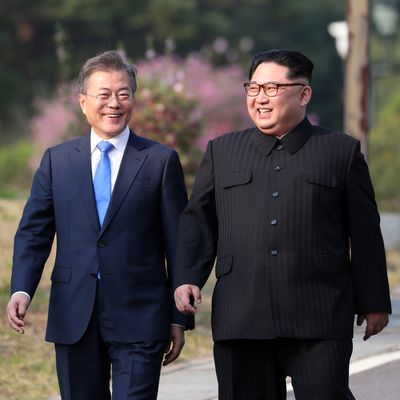
Friday morning, American congressional staffers, intelligence professionals, journalists and talking heads woke up, grabbed their phones, rubbed their eyes, and cursed — what in hell is going on?
Yes, that’s every morning in 2018. But today it wasn’t about Donald Trump, or only peripherally so. Had peace just broken out on the Korean peninsula?
In the wake of a summit between South Korean president Moon Jae-in and North Korean leader Kim Jong-un, some surprising Establishment voices seemed to think so.
William Perry, who served both as secretary of Defense and as a presidential envoy to North Korea, took to Twitter to make the case for optimism:
“Even the most optimistic analysts were surprised at the scope of the declaration,” wrote longtime Korea watcher and Washington Post reporter Anna Fifield. The two men pledged to meet again later this year, restart talks on family reunification, open a liaison office in the North, and engage Washington and perhaps Beijing in negotiations for a Korean War peace treaty.
But all the reasons for skepticism remain as well. Though you wouldn’t know it from some of the coverage, leaders from North and South Korea have met multiple times before. Each meeting has featured the iconic clasped hands raised high, and a declaration with aspirational goals of an end to the war, denuclearization, and improved ties between the two peoples. And while each has been followed by a period of relative calm, each has eventually broken down in mutual recriminations — and further North Korean progress on its nuclear weapons capability.
This time, while the joint statement confirmed the two sides shared the goal of a nuclear-free Korean peninsula, and Moon referred to denuclearization in his public remarks, Kim never did. “No sense of timing … no surprises here,” tweeted Jenny Town, a Johns Hopkins–based expert. Moon’s willingness to use North Korea’s preferred terms for denuclearization also set off alarm bells among U.S. analysts, who see Pyongyang’s long-term goal to be removing all of the U.S. presence from the peninsula, strengthening Beijing’s influence and leaving Japan vulnerable – as well as raising the possibility of a unified Korea under the North’s totalitarian rule.
So how can we square these two competing views of the summit?
For Koreans, the moment truly is historic and filled with possibility — not least because the rhetoric about war, which would primarily take place on their territory and target their civilians, has been so intense over the last year. Moon Jae-in is a human rights lawyer and a longtime proponent of peace, but he is also the child of refugees from the North. In 1976, after North Korean soldiers hacked to death two American soldiers on a tree-trimming mission in the Demilitarized Zone, a young Moon was among the soldiers who returned to cut the offending tree down.
South Korea’s media, which is strenuously partisan, reflected this sense of wonder and possibility across the board yesterday. South Koreans are divided on whether reunification is desirable, and how close the security relationship with the U.S. should be — but they are not divided on the goals of ratcheting down tensions, returning to economic engagement, and above all restarting family reunification as the elders of divided families move into their 80s and 90s.
This reality sets out a hard challenge for President Trump and his administration. Thus far, the summitry gambit has given Kim, Moon, and Trump each what they want: Kim improves his position on the global stage, where he is treated not as an abusive pariah, but as a diplomatic innovator; Moon gets progress on his peace agenda; Trump gets to claim that his aggressive stance over the past year made progress possible and tweet to his base (shortly after yet another tweet trashing the integrity of James Comey):
Of the three leaders, Trump’s position is the most vulnerable. Kim and Moon’s power bases will each find themselves able to live with outcomes that do not roll back Pyongyang’s weapons capability, or leave details vague and off in the future. The national security community around Trump — including his own national security adviser and secretary of State, as well as congressional Republicans and not a few Democrats — will not.
The longtime bipartisan consensus on Korea policy said that a summit, and the start of talks to officially end the Korean War, should be rewards for tangible steps toward disarmament from the North. That approach is no longer tenable, and the strategic adjustment will be painful — especially as Trump and his colleagues busily prepare to dismantle the Iran nuclear deal, the best model of an approach that controls and limits a country’s nuclear program without returning it to zero.
Trump had carefully positioned himself as agnostic about whether he would go to a summit, saying he would wait to see what developed. The perception of success from Panmunjom gives him less wiggle room. And while he may be able to manage the expectations of his supporters, and perhaps even his Republican Party colleagues, with a few tweets, the same will not be true for Seoul, Pyongyang, and — watching quietly — Beijing.





























